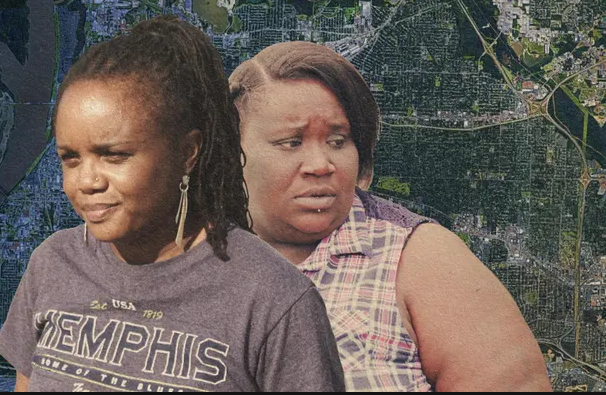Originally published November, 2019. Feature Image: Roshun Austin (L), president/CEO of The Works, Inc., and South Memphis resident Dolores Bateman are featured in the Memphis-based Divides Cities documentary. The short film was produced by The Guardian and gaps food access in Memphis. (The Guardian)

In Memphis, your neighborhood can take years off your life.
It has a lot to do with access to healthy food.
Wealthier neighborhoods have ample access to well-stocked supermarkets. Memphians in more affluent areas like Midtown, East Memphis and the surrounding suburbs can expect to live, on average, 13 years longer than residents in the food deserts of South and North Memphis.
From income gaps to border walls, The Guardian‘s Divided Cities explores the issues that separate people and communities. The newest release in the five-part, international series explores inequities in food access through the lens of South Memphis residents and community leaders.
Black Lives Matter Files: Revisiting StoryBoard and partner archives to understand the roots of unrest. “… a riot is the language of the unheard,” said Dr. King in 1967. More importantly, “what is it that America has failed to hear?” ~Dr. Martin Luther King, Jr., 1967*
Titled “The food deserts of Memphis: Inside America’s hunger capital,” the 13-minute short film shows how we got here, the experiences of South Memphis families, and the people and organizations working toward solutions. Residents, medical experts, and neighborhood leaders weave our city’s story of food, transportation, corporate profit and pervasive poverty.
Two South Memphis residents, Doroles Bateman and Michelle Williams, anchor the film with their personal narratives of the challenges they face trying to feed their families with miles to the nearest grocery store and no personal transportation.
High Ground News’ former executive editor, Madeline Faber, and current managing editor, Cole Bradley, worked with The Guardian team as local fixers for the film. Beginning in March, they helped The Guardian’s team connect with on-the-ground voices in South Memphis and understand the city’s complex history and current state. Memphian Kristin Jones also served as a local fixer during the final planning and filming stages.
Related: Seeing Red l: “Mapping 90 years of redlining in Memphis”
Faber and Bradley pushed for a solutions-oriented approach to the film, rather than a sole focus on contrasting Memphis’ haves and have-nots.
The film’s final cut did not include some of the critical work happening in South Memphis, like scenes shot at Green Leaf Learning Farm, a USDA-certified organic farm in the heart of South Memphis which gives away fresh produce to residents and teaches children about farming, healthy foods and entrepreneurship. It does, however, highlight the work of leaders and leading organizations like Le Bonheur Children’s Hospital, Archie Willis of ComCap Partners and Roshun Austin with The Works, Inc.
The film features scenes from The Works’ South Memphis Farmers Market and The Grocer, which offers fresh produce in the heart of South Memphis, as well as cooking classes and other programming for residents of all ages.

*During his 1967 speech “The Other America,” Dr Martin Luther King, Jr. famously said that “a riot is the language of the unheard.” In 2020, in direct contrast to those summers generations ago, evidence suggests that much of the unrest we are seeing today is not being caused by peaceful, nonviolent protesters, but by factions of groups exploiting the moment.
However, what Dr. King said in 1967 remains true today. It begs the question: Have we made any progress whatsoever?
I’m still convinced that nonviolence is the most potent weapon available to oppressed people in their struggle for freedom and justice. . . . I think America must see that riots do not develop out of thin air. . . . But in the final analysis, a riot is the language of the unheard. And what is it that America has failed to hear? It has failed to hear that the plight of the Negro poor has worsened over the last few years. It has failed to hear that the promises of freedom and justice have not been met. And it has failed to hear that large segments of white society are more concerned about tranquility and the status quo than about justice, equality, and humanity. And so in a real sense our nation’s summers of riots are caused by our nation’s winters of delay. And as long as America postpones justice, we stand in the position of having these recurrences of violence and riots over and over again. Social justice and progress are the absolute guarantors of riot prevention.
~Dr. Martin Luther King, Jr. From his 1967 speech “The Other America”

